Sarah Neidhardt: Twenty Acres A Seventies Childhood in the Woods
May 23, 2024 by David
Filed under Non-Fiction, WritersCast
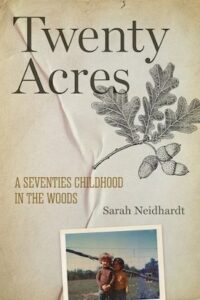 Twenty Acres: A Seventies Childhood in the Woods – Sarah Neidhardt – University of Arkansas Press – Paperback – 320 pages – 9781682262276 – $29.95 – Published March 7, 2023. Audiobook and ebook versions available at varying prices.
Twenty Acres: A Seventies Childhood in the Woods – Sarah Neidhardt – University of Arkansas Press – Paperback – 320 pages – 9781682262276 – $29.95 – Published March 7, 2023. Audiobook and ebook versions available at varying prices.
Twenty Acres is a wonderful, rewarding family memoir that will resonate both for elder veterans of the sixties and seventies “back to the land” counter culture but most especially for their now adult children, of which author Neidhardt is one. She was just a baby when her quite intelligent, middle class, young, naive parents left Colorado Springs to move to an extremely isolated part of the Arkansas Ozarks, where despite being woefully unprepared and underfunded, they managed to build a cabin and set out to live their lives and raise their children away from the materialist world they came from.
Their idealism was quickly met with the harsh realities of country life, of course. Sarah Neidhardt’s early life with her struggling parents and her siblings was not easy, and the crushing poverty and difficulties they endured as a family are reconstructed by Neidhardt as a way to understand her early life in deeply rural Arkansas. Still, the book is filled with many joyful and humorous moments – it’s not an altogether dark story, but a complex one that is filled with the ambiguities and complexities of family life in any time or place.
This story is similar to other back to the land adventures I’ve read that did not end well, or ended with the participants deflated by the rigors of a life they were never prepared for, though it is different from some because of the relatively extreme isolation the Neidhardt family experienced. Communards had it better in some ways than those who set out on their own in places where the culture was so deeply foreign to their generally urban or suburban backgrounds and counter culture values. But the underlying conflicts of culture, education, expectations, and the challenges of rural life really are common for so many of the children of the counter culture, unwilling participants in what was generally a short-lived socio-political explosion that had long lasting ramifications for its youngest and most innocent participants (even as that era’s most deeply held values and beliefs have survived and become entwined in modern culture in so many important ways).
It’s been more than fifty years since the era of the hippies, and books like this one will help set down and explain the history of that brief period of time, when so many young people thought we could change the world for the better. Talking to Sarah about her book, her family, and the process of writing their story was rewarding for me and I hope for all who listen to our conversation.
Sarah Neidhardt has worked as a bookseller, secretary, paralegal, copyeditor, and stay-at-home mother. She grew up in Arkansas and Northern California and now lives in Portland, Oregon, with her husband and teenage son.
“Disillusioned with the modern world and idealistic about living closer to nature, Sarah Neidhardt’s parents packed up from Colorado–a place that some other back-to-landers would seek out–and moved to small, isolated Fox, Arkansas to attempt living completely self-sufficiently and off-the-grid. In this memoir, Neidhardt examines her memories from that time, and also pinpoints one of the most particularly problematic parts of the back-to-the-land movement, which is that many of its participants were anchored in privilege. … A memoir infused with both empathy and inquiry.”—–Wendy J. Fox, Electric Literature
Author website here.
Buy the book here.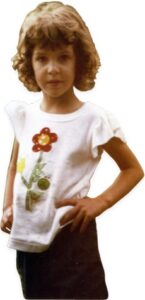

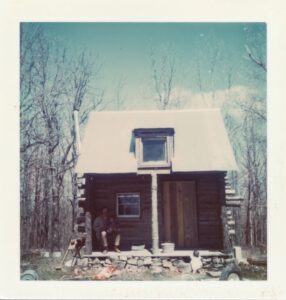
Podcast: Play in new window | Download
Baron Wormser: The Road Washes Out in Spring
October 7, 2023 by David
Filed under Non-Fiction, WritersCast
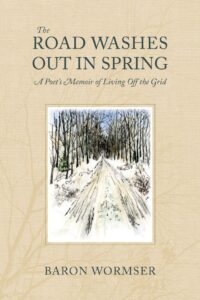 The Road Washes Out in Spring: A Poet’s Memoir of Living Off the Grid – Baron Wormser – Brandeis University Press – 9781684581603 – 214 pages – paperback – $24.95 – March 7, 2023 – ebook versions available at lower prices
The Road Washes Out in Spring: A Poet’s Memoir of Living Off the Grid – Baron Wormser – Brandeis University Press – 9781684581603 – 214 pages – paperback – $24.95 – March 7, 2023 – ebook versions available at lower prices
Baron Wormser is a poet and prose writer whose work I have been familiar with for many years. Back in the 1970s, he and his wife Janet, moved to rural Maine as part of the “back to the land” wave that had been inspired by hippies and the Stewart Brand’s influential Whole Earth Catalog and especially the writings of the now almost mythic Helen and Scott Nearing, vegetarians who pioneered simple living in the 1930s and 40s.
His memoir of that time was originally published almost twenty years ago and now there is a new edition of this meditative, almost poetic narrative of simple living.
Baron and his family lived in a house they built in Maine with no electricity or running water. Much like the Nearings, they raised (and canned) much of their own food, carried water from their well, and read through the long winter nights by the light of kerosene lamps.
As Wormser states early in this book, living off the grid was not meant to be a statement of anything. In fact, as complete novices to the life they set out to live, it turned out that they had built their house in a place that there was no electricity and initially they could not afford to pay to have power lines run to their house. As time went on, they embraced the simplicity of their rural lives and learned from their experienced neighbors, for whom life was not a choice and “lifestyle” would have been a meaningless term.
Wormser refuses any simple understanding or explanation for the lives he and his wife chose for the twenty five year period during which they raised their children and became integral to the local community. He writes about nature and the simple life without sentimentalizing anything, appreciates the good and faces the difficulties head on without failing to note the complexity of everything we prefer to think of as simple. He is a careful thinker and writer, and his poetic self is a presence at all times. Here is a lovely excerpt from the book:
If there is such a thing as a mutable eternity, it is snow falling in the woods. I am thinking of a windless, steady plummeting. Nothing is moving except for snowflakes. You can hear the snow faintly ticking on the pine needle branches. You can hear it descending—a soft sift of air. You are held in the hand of something enormous yet gentle, something extraordinary yet calming, something evanescent yet quite palpable (from a Latin word meaning “to touch gently”). Every surface receives the snow in its way. A large, fallen, curled maple leaf collects the snow in its center. A boulder”s stored heat resists the snow at first. Then its surface turns wet as if it were raining. Then with un-boulder-like delicacy a thin frizz accumulates. On top of the garden gate a fragile white skein begins to perch. Little, almost derby-like hats grow on the garden fence posts. The mown grass around the house fills in gradually. The stiff, frozen blades seem like little heights. Then the snow, as it mounts, receives itself. Another landscape is created and for months we live in that landscape.
When I was in my twenties, I shared the impulse to “head for the country,” where I tried and failed to make a go of living on the land. I greatly admire and appreciate what the commitment that Baron and his family made to live in Maine for a quarter century. And it was a deep pleasure to read this memoir of that time.
In 2000 Baron was appointed Poet Laureate of Maine by Governor Angus King. He currently resides in Montpelier, Vermont, with his wife. In 2009 he joined the Fairfield University MFA program. He works in schools with both students and teachers. Wormser has received the Frederick Bock Prize from Poetry and the Kathryn A. Morton Prize along with fellowships from Bread Loaf, the National Endowment for the Arts and the John Simon Guggenheim Memorial Foundation. In 2000 he was writer in residence at the University of South Dakota. Wormser founded the Frost Place Conference on Poetry and Teaching and also the Frost Place Seminar. His most recent book of poetry is The History Hotel, published by CavanKerry Press.
In other rooms and beyond those rooms
So much was occurring that went on happily
And unhappily, indifferent to protocols,
Brimming with anemones, half-heard melodies,
Averted glances.
(from “Elegy for the Poet Adam Zagajewski”)
Buy The Road Washes Out in Spring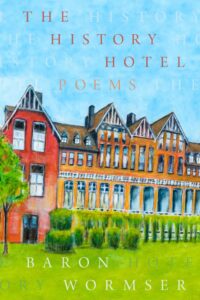
Podcast: Play in new window | Download
